

How to Respond to a “Revise and Resubmit” from an Academic Journal: Ten Steps to a Successful Revision. When I submit an article to a top journal, often the best possible outcome I can hope for is that the editors will invite me to respond to the reviewers’ comments and resubmit the article.
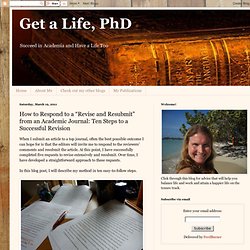
At this point, I have successfully completed five requests to revise extensively and resubmit. Over time, I have developed a straightforward approach to these requests. In this blog post, I will describe my method in ten easy-to-follow steps. Step One: Read the Letter. Assignment Calculator. So You Got Scooped - Now What? Falling short: seven writers reflect on failure. Rules of Graphic Design poster series on Behance. Seven reasons why journals reject papers. I’ve written about rejections several times, and most of this is scattered throughout the blog, so I thought it might be helpful to amalgamate the most important points together.
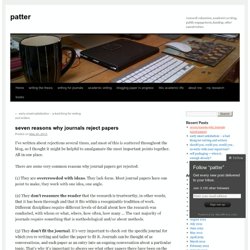
All in one place. There are some very common reasons why journal papers get rejected: (1) They are overcrowded with ideas . They lack focus. Most journal papers have one point to make, they work with one idea, one angle. The journal ecosystem. “Where should I submit this manuscript?”
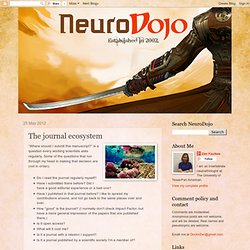
Is a question every working scientists asks regularly. Some of the questions that run through my head in making that decision are (not in order):Do I read the journal regularly myself? Have I submitted there before? Did I have a good editorial experience or a bad one? Have I published in that journal before? It seems that for some people, there is one question that carries more weight than all the others. Early Career Publishing in run-up to REF (with tweets) · DrSustainable. Peer review: The nuts and bolts · Resources. "Peer Review: meeting the challenges" at ESOF 2012 (with tweets) · senseaboutsci.
Analytical Chemistry Journals, Academic Books & Online Media. Commentary: Too many authors, too few creators. A few years ago, Robert Fefferman, dean of physical sciences at the University of Chicago, made an interesting remark.
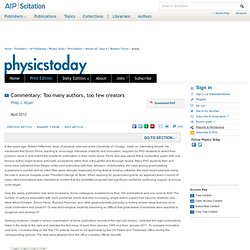
He mentioned that Enrico Fermi, wanting to encourage individual creativity and innovation, required his PhD students to select their problem, solve it, and submit the results for publication in their name alone. Fermi also was aware that a multiauthor paper with one famous author might receive automatic acceptance rather than a thoughtful and thorough review. Many PhD students then and since have published their theses under joint authorship with their advisers. Unfortunately, the need among grant-seeking academics to publish and be cited often grew stronger, especially during federal funding cutbacks, the most recent example being the cuts in science budgets under President George W.
Bush. Over the years, publication lists were increasing. Seeking answers, I made a cursory examination of some publication records of the last half century. Scientific writing and publishing. A Blog about Academic Writing. Index of Study Guides. 5 ways to develop critical thinking in ICT. How do you encourage pupils and students to think critically in the context of educational technology?
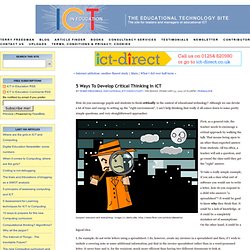
Although we can devote a lot of time and energy to setting up the "right environment", I can't help thinking that really it all comes down to some pretty simple questions, and very straightforward approaches. Suspect everyone and everything! Image (c) olarte.ollie, as a general rule, the teacher needs to encourage a critical approach by walking the talk. That means being open to an other-than-expected answer from students. All too often, a teacher will ask a question, and go round the class until they get the "right" answer. The launch of #acwri live chat · dratarrant. Patter. The purpose of the literature review shapes the way that noting is done.
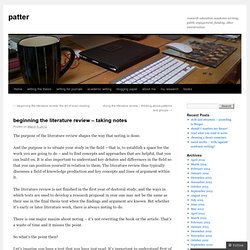
And the purpose is to situate your study in the field – that is, to establish a space for the work you are going to do – and to find concepts and approaches that are helpful, that you can build on. It is also important to understand key debates and differences in the field so that you can position yourself in relation to them. The literature review thus typically discusses a field of knowledge production and key concepts and lines of argument within it. The 5 Species of Journal Reviewers - Do Your Job Better. By Robert A.
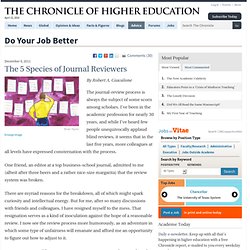
Giacalone The journal-review process is always the subject of some scorn among scholars. I've been in the academic profession for nearly 30 years, and while I've heard few people unequivocally applaud blind reviews, it seems that in the last five years, more colleagues at all levels have expressed consternation with the process. Getting Published - strategies for successful researchers - UWE Skills Development. Women in math, and the overhaul of the publishing system « The Accidental Mathematician. If you have not yet heard of the Elsevier boycott, you have a lot of reading to catch up on.
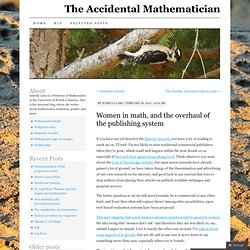
Everyone's a critic. Everyone's a critic, they say.
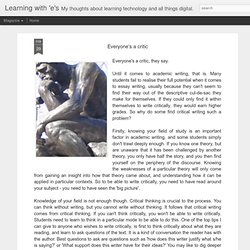
Until it comes to academic writing, that is. Many students fail to realise their full potential when it comes to essay writing, usually because they can't seem to find their way out of the descriptive cul-de-sac they make for themselves. If they could only find it within themselves to write critically, they would earn higher grades. So why do some find critical writing such a problem? Firstly, knowing your field of study is an important factor in academic writing, and some students simply don't trawl deeply enough.
Knowledge of your field is not enough though. Academic writing has the capability to generate a great deal of angst. In his blog post 5 ways to develop critical thinking in ICT, Terry Freedman offers some great advice on how teachers can probe understanding by repeatedly asking 'why? '